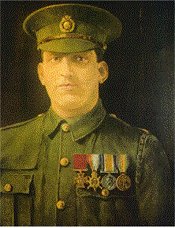Walter Richard Parker facts for kids
Quick facts for kids
Walter Richard Parker
|
|
|---|---|
 |
|
| Born | 20 September 1881 Grantham, Lincolnshire, England |
| Died | 28 November 1936 (aged 55) Stapleford, Nottinghamshire, England |
| Buried |
Stapleford Cemetery
|
| Allegiance | United Kingdom |
| Service/ |
Royal Marines |
| Years of service | 1914–1916 |
| Rank | Lance corporal |
| Unit | Royal Marine Light Infantry |
| Battles/wars | First World War |
| Awards | Victoria Cross |
Walter Richard Parker (born September 20, 1881 – died November 28, 1936) was a brave British soldier. He was a Royal Marine and an ironworker. He received the Victoria Cross, which is the highest award for bravery given to soldiers in Britain and Commonwealth countries. This medal is given for amazing courage when facing the enemy.
Contents
Walter Richard Parker: A Hero's Story
Bravery in the First World War
Walter Richard Parker was 33 years old when the First World War began. He was a lance corporal in the Royal Marine Light Infantry. This was part of the Royal Marines, a special part of the Royal Navy. He showed incredible bravery during this war.
A Dangerous Mission
On the night of April 30 to May 1, 1915, something amazing happened. It was during the Gallipoli campaign at a place called Gaba Tepe. Lance Corporal Parker was a volunteer stretcher-bearer. This meant he helped carry wounded soldiers to safety.
He went with a group of soldiers to take supplies to a trench. This trench had about 40 men and several wounded soldiers. It was a very dangerous mission. There were no safe paths to the trench. Many soldiers had already been hurt trying to reach it.
Alone and Wounded
Parker and his group had to cross about 400 yards of open land. Enemy machine-gun and rifle fire swept across this area. Sadly, the rest of his group were either killed or wounded. Lance Corporal Parker was left alone.
He kept going and reached the trench. There, he immediately helped the wounded soldiers. The trench was finally emptied early the next morning. Even though Parker himself was seriously wounded, he kept helping the injured. He made sure they were cared for and moved to safety.
The Victoria Cross Award
Parker never fully recovered from his injuries. He had to leave the military in June 1916 because of his wounds. His award, the Victoria Cross, was announced much later. It appeared in the London Gazette on June 22, 1917.
The delay happened because many of his commanding officers were wounded. They were hurt during the same battle where Parker showed his bravery. The report also said Parker had been brave for days before this event. He was in charge of the stretcher bearers. This was a very tough job. Almost every wounded soldier had to be moved over open ground while under enemy fire.
His Legacy Today
Walter Richard Parker passed away at age 55. He died in Stapleford, near Nottingham. He is buried in the local cemetery there.
Every year, a special service is held in Stapleford. The local Royal Marines Association holds it on the Sunday closest to April 30. This service remembers his bravery. There is also a paved area in Stapleford town center named in his honor.
You can see Walter Parker's Victoria Cross medal today. It is on display at the Royal Marines Museum. This museum is located in Southsea, England.
 | Madam C. J. Walker |
 | Janet Emerson Bashen |
 | Annie Turnbo Malone |
 | Maggie L. Walker |

